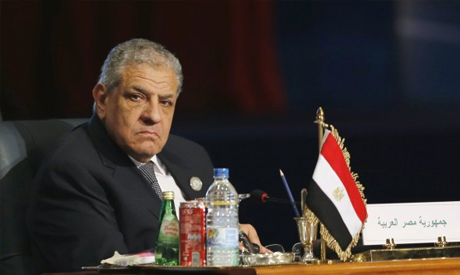
Egyptian Prime Minister Ibrahim Mahlab attends the opening meeting of the Arab Summit in Sharm el-Sheikh, in the South Sinai governorate, south of Cairo, March 28, 2015 (Photo: Reuters)
Prime Minister Ibrahim Mahlab has rejected claims the state is promoting candidates or groups ahead of the upcoming parliamentary election.
"The government swore an oath not to talk to anyone about the election and hasn't asked anyone to nominate themselves or backed anyone, this is a definitive decision," he said in comments reported by state news agency MENA.
The government is conducting meetings with representatives of political parties to discuss laws governing the election. The poll will be the first since the Muslim Brotherhood-majority lower house was dissolved by a court order in 2012.
While Mahlab acknowledged disagreements among parties on certain issues, he insisted the dialogue has been successful in general.
The government announced the talks shortly after the election, which was scheduled to take place in March, was postponed after a constitutional court ruled two articles of the law on electoral constituencies were unconstitutional.
While these are being amended, government-led talks were held to reach a consensus on the election law as a whole.
Opposition
Some parties had criticised the law and others withdrew from the election before the postponement over what they said was a meagre 20 percent of seats reserved for party lists that will be elected with an absolute system – which means any party garnering over 50 percent of the vote gets all seats in a constituency – which many deemed unfair.
One of the opponents of the law, the Egyptian Social Democratic Party, announced this week after attending one session with Mahlab that they would not take part in the rest of the sessions and expressed distrust of the government's intentions in reforming the law.
"There was no change in the terms or the meeting agenda and there was no clear sign of a desire to use our consensual proposal... we will not attend again without a change in the terms of the invitation and its goals," a statement by the party read, referring to a joint-proposal by some of the parties presented to Mahlab.
In a statement to Ahram Online, the party's secretary general, Ahmed Fawzy, accused the government of sponsoring certain groups and of not having a true intention to change the law fundamentally.
"We were apprehensive when we attended the first session, and our fears turned out to be true. Mahlab would tell us things that are different from Transitional Justice Minister Ibrahim Heneidy [in charge of election law amendments], they're not serious," he said.
Fawzy also accused the state of backing certain people. "There were representatives attending [the meeting] no one has heard of, for parties no one has heard of," he told Ahram Online, suspecting security agencies of interfering to push their loyalists into parliament.
"There won't be a political life in Egypt if this continues," Fawzy concluded.
Sayed El-Badawy, head of the liberal Wafd party, who attended one of the sessions this week, said in statements to Al-Ahram Arabic news website that he believes there will not be a significant change to the election law, but Mahlab's hands are tied.
"There is a persistent state of confusion regarding the election law amendments which has greatly annoyed everyone... no good will come of this dialogue. It is unconstitutional and we have notified the government with our view but to no avail," El-Badawy said.
Thursday will see the last day of the dialogue. There is no set date for the start of the elections, but Mahlab said the government is hoping to hold them before the Islamic holy month of Ramadan in June.
Short link: